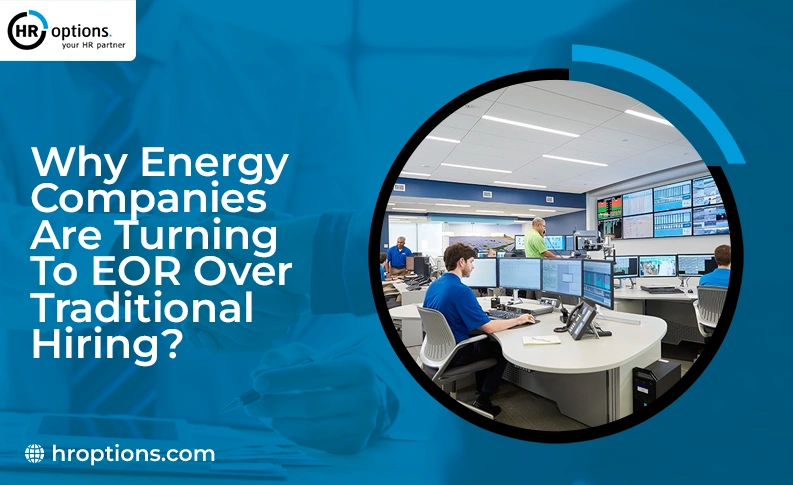Traditional hiring often slows down energy companies when they need to fill roles quickly. It involves long recruitment processes and heavy paperwork. There is also uncertainty around compliance, especially when projects span multiple regions. Energy companies need flexibility, speed, and the right people on-site without delays. That is why many are now choosing EOR over traditional hiring for energy companies. This approach helps you scale your team quickly, find specialized talent fast, and handle employment laws without headaches. It also keeps projects on track, helps manage costs, and reduces HR burdens.
Reasons Why Energy Companies Prefer EOR Over Traditional Hiring
Let’s take a look at the eight reasons energy companies are moving to EOR services.
1. Hiring Speed Without the Wait
Energy companies often work on tight deadlines. Waiting weeks or months to fill roles can hold projects back. Traditional hiring requires advertising, interviews, negotiations, and paperwork before a candidate starts. An EOR speeds up this process. They handle onboarding and paperwork quickly. This allows skilled workers to start immediately. It means you can meet project timelines without staffing delays. Your new team members will be ready with proper documentation from day one.
2. Access to the Right Specialists
Energy projects often require engineers, safety experts, or technicians with very specific skills. Traditional hiring can limit your access to talent, especially when you need specialists for short-term phases. An EOR has access to broader talent pools. They can bring in specialists quickly without long recruitment delays. This helps your projects move forward with the right expertise on-site when it matters most. It avoids bottlenecks that can slow down critical phases.
3. Better Cost Management
Hiring directly often comes with costs like benefits management, payroll taxes, and compliance penalties. These costs can push projects over budget. EOR vs direct hiring shows that EOR services offer clear and predictable pricing. They handle employment responsibilities, helping you control labor costs. This predictability helps energy companies keep budgets intact. It also gives you flexibility to adjust your workforce as needed without financial surprises.
4. Compliance Made Easy
Energy companies often operate across multiple states or even countries. Each area has different labor laws. Managing these laws internally can be complex and risky. An EOR ensures your workforce stays compliant with local and federal laws. This includes tax withholding and benefits requirements. It reduces the risk of penalties and legal trouble that could halt your projects. Your team can focus on delivering energy solutions. The EOR manages compliance and documentation in the background.
5. Less HR Work for Your Team
Traditional hiring adds HR tasks like benefits tracking, payroll, and compliance reporting to your team’s workload. These tasks take time and focus away from project execution. An EOR handles these HR functions for you. They manage payroll, benefits, and compliance documents. This reduces stress on your internal staff. It lets them focus on operations, safety, and project quality instead of paperwork.
6. Flexible Workforce Scaling
Energy projects change in size and scope as they progress. They may need more people during peak phases and fewer during quieter periods. Traditional hiring makes it hard to adjust your workforce quickly. An EOR gives you flexibility to add skilled workers when needed. You can also scale down when a phase ends, without lengthy hiring or layoff processes. This keeps your workforce aligned with project needs without unnecessary overhead.
7. Lower Risk of Worker Misclassification
Misclassifying employees can lead to audits and financial penalties. This risk increases when managing contractors across different states. Traditional hiring can make classification management challenging. An EOR takes responsibility for employment classifications. They ensure compliance, reducing your risk of legal and financial issues. This protects your company. It also lets you bring in the right people confidently for your projects.
8. Keeping Projects on Track
Energy projects need consistent progress to avoid delays and cost overruns. Staffing issues often slow down projects. This happens especially if you can’t find specialized workers quickly or if HR paperwork causes onboarding delays. An EOR helps you keep projects on track by providing fast access to qualified workers. They manage all employment processes for you. This ensures your projects maintain quality and stay on schedule. You can meet client expectations without unnecessary slowdowns.
Conclusion
It’s easy to see why many energy companies are shifting to EOR instead of sticking with traditional hiring. They need to move fast and adjust teams as project needs change. They also want to avoid getting tangled in complex compliance issues. EOR improves workforce flexibility for energy engineering projects. EOR over traditional hiring for energy companies helps you find the right people quickly. It keeps your budget steady and lets your HR team focus on what truly matters. With experts managing employment details, you spend less time on paperwork. You spend more time keeping your projects running safely and on schedule. This way, you deliver quality results without the usual hiring headaches. If you are ready to see how EOR can support your energy projects, HR Options is here to help.








